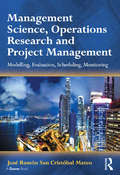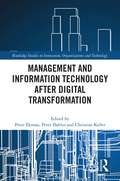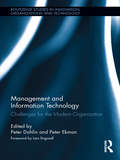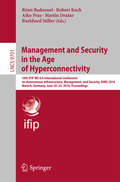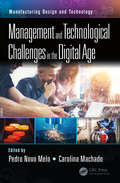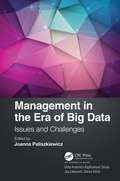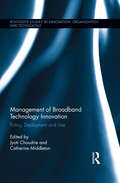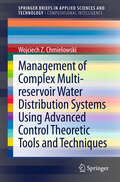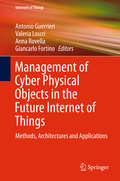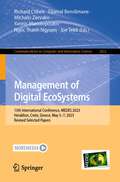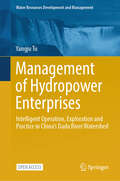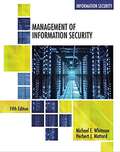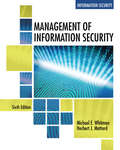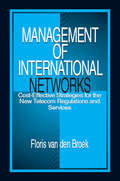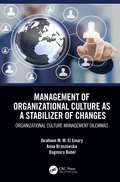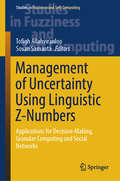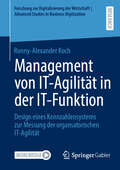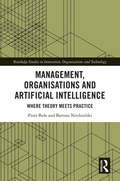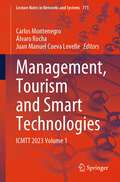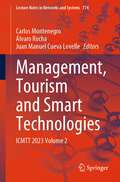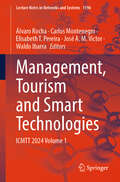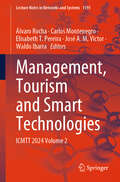- Table View
- List View
Management Perspective for Transport Telematics: 18th International Conference on Transport System Telematics, TST 2018, Krakow, Poland, March 20-23, 2018, Selected Papers (Communications in Computer and Information Science #897)
by Jerzy MikulskiThis book constitutes the thoroughly refereed proceedings of the 18th International Conference on Transport Systems Telematics, TST 20187, held in Krakow, Poland in March 2018.The 36 full papers presented in this volume were carefully reviewed and selected from 128 submissions. They present and organize the knowledge from within the field of telematics in road transport, in rail transport, in marine transport, in air transport, in logistics.
Management Science, Operations Research and Project Management: Modelling, Evaluation, Scheduling, Monitoring
by José Ramón MateoDue to its societal and economic relevance, Project Management (PM) has become an important discipline and a concept critical to modern organizations, public and private. PM as an academic discipline is discussed both in Management Science and in Operations Research. Management Science tends to focus on quantitative tools and the soft skills necessary to manage projects successfully. Operations Research gives the essential scientific contribution to the success of project management through the development of models and algorithms. In Management Science, Operations Research and Project Management, José Ramón San Cristóbal Mateo fills the gap between scientific research and the practical application of that research. Project managers need formal training in decision-making but sometimes, they do not have an in-depth knowledge of Operations Research or they lack the necessary theoretical background. This book, with its focus on the quantitative models of Operations Research and Management Science applied to Project Management, provides project managers with the tools and methods necessary to manage projects successfully. Project managers operate in a complex global environment, in which numerous factors need to be considered, such as minimizing total project costs, meeting contracted dates, and ensuring that activities achieve certain quality levels. The focus here on the application of quantitative models of Operations Research and Management Science applied to Project Management provides them with the tools and methods necessary to make sound decisions.
Management and Information Technology after Digital Transformation (Routledge Studies in Innovation, Organizations and Technology)
by Peter Dahlin Peter Ekman Christina KellerWith the widespread transformation of information into digital form throughout society – firms and organisations are embracing this development to adopt multiple types of IT to increase internal efficiency and to achieve external visibility and effectiveness – we have now reached a position where there is data in abundance and the challenge is to manage and make use of it fully. This book addresses this new managerial situation, the post-digitalisation era, and offers novel perspectives on managing the digital landscape. The topics span how the post-digitalisation era has the potential to renew organisations, markets and society. The chapters of the book are structured in three topical sections but can also be read individually. The chapters are structured to offer insights into the developments that take place at the intersection of the management, information systems and computer science disciplines. It features more than 70 researchers and managers as collaborating authors in 23 thought-provoking chapters. Written for scholars, researchers, students and managers from the management, information systems and computer science disciplines, the book presents a comprehensive and thought-provoking contribution on the challenges of managing organisations and engaging in global markets when tools, systems and data are abundant.
Management and Information Technology: Challenges for the Modern Organization (Routledge Studies in Innovation, Organizations and Technology)
by Lars Engwall Peter Dahlin Peter EkmanInformation technology has come to play an important role in organizations over the last few decades. Though it began as an entity dealt with by specialists, IT has evolved to become an everyday tool with both operational and strategic impacts. Most modern organizations have adopted different forms of IT, and become dependent on their computer-based information systems and their peripherals for everyday operations. Information technology offers opportunities to increase efficiency, customer value, and competitiveness. Given the financial investment in IT required by organizations to remain competitive, IT has become a resource that needs to be managed. Management and Information Technology evaluates organizations’ utilization of IT including knowledge management and e-learning, accounting, and business relationships. Presenting theories to help the reader understand the varying roles IT can occupy in different organizations, this volume illustrates the ways in which IT has become a key strategic tool.
Management and Security in the Age of Hyperconnectivity
by Rémi Badonnel Robert Koch Aiko Pras Martin Drašar Burkhard StillerThis book constitutes the refereed proceedings of the 10th IFIP WG 6. 6 International Conference on Autonomous Infrastructure, Management, and Security, AIMS 2016, held in Munich, Germany, in June 2016. The 7 full papers presented together with 3 short papers were carefully reviewed and selected from 22 submissions. The volume also includes 9 papers presented at the AIMS PhD workshop. They were reviewed in a separate process and selected from 21 submissions. The full papers are organized in topical sections on autonomic and smart management and security attacks and defenses. The workshop papers are organized in topical sections on management of future networks and security management. The short papers deal with methods for management and security.
Management and Sustainability in the Belt and Road
by Andrew W. H. Ip Lianne K. W. LamChina’s Belt and Road Initiatives (BRI) is an ambitious infrastructure project conceived in 2013 by President Xi Jinping with development and investment initiatives stretching from Asia and Europe that reflect the original Silk Road with business networks through countries such as Afghanistan, Kazakhstan, Kyrgyzstan, Tajikistan, Turkmenistan, and Uzbekistan, as well as India and Pakistan, spanning a route of more than 4,000 miles and history that can be dated back more than 2,200 years. Given the background of China’s unique approach in fighting COVID-19, and against the backdrop of sluggish economic growth, innovation, and management, sustainable development of BRI will be the key and the driving force for the post-pandemic economic recovery of many countries, especially as BRI countries now account for nearly 30% of China’s foreign trade and 15% of outward direct investment. The vision to create a vast network of railways, energy pipelines, highways, and streamlined border crossings to expand the international use of Chinese currency and improve connectivity to China is good foresight and proved fortuitous when the COVID-19 pandemic came to plague the world, and amid the conflicts between the United States and China as well as the war between Russia and Ukraine. Since the inception of BRI, many books have been written to cover topics ranging from globalization to detailing how China’s business and politics are a major motivation for China’s overseas economic activities with case studies and practices, yet few of these books provide a structured approach to the sustainable management of BRI projects. This book is about how to manage the innovation, sustainability, and business necessary to make BRI work and how to handle the issues, problems, and crises that may arise in the process. Participants of BRI projects can take on many different roles, but ultimately, it is team effort and leadership that creates successful projects. Here, readers will find guidelines and insights to survive and prosper in a myriad of BRI opportunities and risks. Most important of all, this book provides a glimpse of different approaches for success in BRI projects, including sustainability, environmental issues, social and political aspects, technology, choice of industry, project management, education and training, governance, and many more.
Management and Technological Challenges in the Digital Age (Manufacturing Design and Technology)
by Carolina Machado Pedro Novo MeloBusinesses operate amid a digital age, and unsurprisingly, technology has engendered tools that now predominate all corners of the workplace. The ascendancy of new hardware and software poses new challenges for professionals in the field of management and human resources as corporations and companies routinely implement and incorporate digital software for goals such as improving worker productivity and tasks such as screening highly qualified candidates for vacancies. In the face of rapid change, professionals must investigate how the use of digital technology affects the culture of hiring processes, employee morale, company management, and corporate image. This book aims to promote research related to these new trends and open a new field within the areas of management and engineering. Through the course of nine chapters, contributors to Management and Technological Challenges in the Digital Age grapple with the theoretical and practical implications that technological usage carries across the range of small and large organizations in the world of business. <li>Focuses on the latest research findings that are occurring in this field in different countries <li>Shows how companies around the world are facing today's technological challenges <li>Shares knowledge and insights on an international scale <li>Keeps the readers and researchers informed about the latest developments in the field and forthcoming international studies <li>Explains how the use of technology allows management to take a more strategic role in organizations <P><P>This book affords a thorough engagement with the progresses and setbacks made through the enlistment of technological equipment and computerized procedures in the field of human resources and management while interrogating the future challenges of technology’s role.
Management in the Era of Big Data: Issues and Challenges (Data Analytics Applications)
by Joanna PaliszkiewiczThis book is a wonderful collection of chapters that posits how managers need to cope in the Big Data era. It highlights many of the emerging developments in technologies, applications, and trends related to management’s needs in this Big Data era. —Dr. Jay Liebowitz, Harrisburg University of Science and Technology This book presents some meaningful work on Big Data analytics and its applications. Each chapter generates helpful guidance to the readers on Big Data analytics and its applications, challenges, and prospects that is necessary for organizational strategic direction. —Dr. Alex Koohang, Middle Georgia State University Big Data is a concept that has caught the attention of practitioners, academicians, and researchers. Big Data offers organizations the possibility of gaining a competitive advantage by managing, collecting, and analyzing massive amounts of data. As the promises and challenges posed by Big Data have increased over the past decade, significant issues have developed regarding how data can be used for improving management. Big Data can be understood as large amounts of data generated by the Internet and a variety of connected smart devices and sensors. This book discusses the main challenges posed by Big Data in a manner relevant to both practitioners and scholars. It examines how companies can leverage Big Data analytics to act and optimize the business. This book brings together the theory and practice of management in the era of Big Data. It offers a look at the current state of Big Data, including a comprehensive overview of both research and practical applications. By bringing together conceptual thinking and empirical research on the nature, meaning, and development of Big Data in management, this book unifies research on Big Data in management to stimulate new directions for academic investigation as well as practice.
Management of Broadband Technology and Innovation: Policy, Deployment, and Use (Routledge Studies in Innovation, Organizations and Technology)
by Jyoti Choudrie Catherine MiddletonWhen one considers broadband, the Internet immediately springs to mind. However, broadband is impacting society in many ways. For instance, broadband networks can be used to deliver healthcare or community related services to individuals who don't have computers, have distance as an issue to contend with, or don't use the internet. Broadband can support better management of scarce energy resources with the advent of smart grids, enables improved teleworking capacity and opens up a world of new entertainment possibilities. Yet scholarly examinations of broadband technology have so far examined adoption, usage, or diffusion but missed exploring the capacity of broadband networks to enable new applications, the management aspects of funding and developing broadband-enabled services, or the policy environment in which such networks are developed. This book explores a wide range of issues associated with the deployment and use of broadband including its impacts on individuals, organizations, and society, and offers a generalist understanding of the technical aspects of broadband. Management of Broadband Technology and Innovation offers insights on broadband from the perspectives of Information Systems, Management, Strategy, and Communications Policy scholars, drawing on research from these disciplines to inform diverse aspects of broadband deployment, policy, and use. Issues associated with a subject technical in nature, but now researched in many ways, are emphasised. This book explains various softer aspects of broadband deployment and use, focusing on the benefits of broadband rather than on details of the technology.
Management of Complex Multi-reservoir Water Distribution Systems using Advanced Control Theoretic Tools and Techniques
by Wojciech Z. ChmielowskiThis study discusses issues of optimal water management in a complex distribution system. The main elements of the water-management system under consideration are retention reservoirs, among which water transfers are possible, and a network of connections between these reservoirs and water treatment plants (WTPs). System operation optimisation involves determining the proper water transport routes and their flow volumes from the retention reservoirs to the WTPs, and the volumes of possible transfers among the reservoirs, taking into account transport-related delays for inflows, outflows and water transfers in the system. Total system operation costs defined by an assumed quality coefficient should be minimal. An analytical solution of the optimisation task so formulated has been obtained as a result of using Pontryagin's maximum principle with reference to the quality coefficient assumed. Stable start and end conditions in reservoir state trajectories have been assumed. The researchers have taken into account cases of steady and transient optimisation duration. The solutions obtained have enabled the creation of computer models simulating system operation. In future, an analysis of the results obtained may affect decisions supporting the control of currently existing water-management systems.
Management of Cyber Physical Objects in the Future Internet of Things
by Antonio Guerrieri Valeria Loscri Anna Rovella Giancarlo FortinoThis book focuses on newmethods, architectures, and applications for the management of Cyber PhysicalObjects (CPOs) in the context of the Internet of Things (IoT). It covers a wide range of topics relatedto CPOs, such as resource management, hardware platforms, communication andcontrol, and control and estimation over networks. It also discussesdecentralized, distributed, and cooperative optimization as well as effectivediscovery, management, and querying of CPOs. Other chapters outline theapplications of control, real-time aspects, and software for CPOs and introducereaders to agent-oriented CPOs, communication support for CPOs, real-world deploymentof CPOs, and CPOs in Complex Systems. There is a focus on the importance ofapplication of IoT technologies for Smart Cities.
Management of Digital EcoSystems: 15th International Conference, MEDES 2023, Heraklion, Crete, Greece, May 5–7, 2023, Revised Selected Papers (Communications in Computer and Information Science #2022)
by Richard Chbeir Yannis Manolopoulos Djamal Benslimane Michalis Zervakis Ngoc Thanh Ngyuen Joe TekliThis book constitutes the revised selected papers of the 15th International Conference, MEDES 2023, Heraklion, Crete, Greece, May 5–7, 2023The 29 full papers included in this volume were carefully reviewed and selected from 52 submissions. The papers focus on the following topics: Design Issues & BlockChain, Query Processing and Visualization, Learning Issues, Services and Systems, Business and Communication Technologies, Digital Twin and Security, Architecture Technologies, Time and Text Management.
Management of Hydropower Enterprises: Intelligent Operation, Exploration and Practice in China’s Dadu River Watershed (Water Resources Development and Management)
by Yangju TuThis open access book highlights the hydropower potential of the Dadu River watershed in Sichuan province, Southwest China, and an important part of the flood control system for the Changjiang (Yangtze) River. Ensuring the safe, scientific, and economical operation of hydropower stations is the basis for sustainable development for hydropower enterprises and is the foremost task during the process of running and managing hydropower enterprises. Because of the special natural, geographical, and cultural environment in the Dadu River watershed, the operation and management of hydropower enterprises face numerous challenges due to complex hydrometeorology, frequent earthquakes and geological hazards, fragile ecological environment, and difficult conditions for production. In order to effectively resolve the many challenges on the Dadu River in terms of reservoir group operational control, power station group power dispatch, operation and inspection of equipment for the whole watershed, operation of multiple power station hydraulic structures, and watershed enterprise management, the multiple power stations in the Dadu River watershed adhere to the concept of innovative development and actively embrace advanced technologies such as cloud computing, big data, Internet of Things (IoT), and artificial intelligence. In 2014, the Dadu River Company was the first in the corporate world to put forward the dream and approach for the construction of the intelligent enterprise, while boldly carrying out exploration and practice in intelligent operations and management in the Dadu River watershed.
Management of Information Security
by Michael E. Whitman Herbert J. MattordDiscover a managerially-focused overview of information security with a thorough presentation of how to most effectively administer it with MANAGEMENT OF INFORMATION SECURITY, 5E. <p><p>Insightful, engaging content prepares you to become an information security management practitioner able to secure systems and networks in a world where continuously emerging threats, ever-present attacks, and the success of criminals illustrate the weaknesses in current information technologies. You'll develop both the information security skills and practical experience that organizations are looking for as they strive to ensure more secure computing environments. <p><p>This edition offers a tightened focus on key executive and managerial aspects of information security while still emphasizing the foundational material to reinforce key concepts. Updated content reflects the most recent developments in the field, including NIST, ISO, and security governance.
Management of Information Security
by Michael E. Whitman Herbert J. MattordMANAGEMENT OF INFORMATION SECURITY, Sixth Edition prepares you to become an information security management practitioner able to secure systems and networks in a world where continuously emerging threats, ever-present attacks and the success of criminals illustrate the weaknesses in current information technologies. You'll develop both the information security skills and practical experience that organizations are looking for as they strive to ensure more secure computing environments. The text focuses on key executive and managerial aspects of information security. It also integrates coverage of CISSP and CISM throughout to effectively prepare you for certification. Reflecting the most recent developments in the field, it includes the latest information on NIST, ISO and security governance as well as emerging concerns like Ransomware, Cloud Computing and the Internet of Things.
Management of International Networks: Cost-Effective Strategies for the New Telecom Regulations and Services
by Floris van den BroekEffective management of a communications network can be a difficult and costly activity, and even more so when the network crosses international borders. International network managers face a number of issues that are crucial to strategic decision-making, including the varying telecommunications regulations, operators, and services found within-as
Management of Organizational Culture as a Stabilizer of Changes: Organizational Culture Management Dilemmas
by Ibrahiem M. El Emary Anna Brzozowska Dagmara BubelNo enterprise today is proud of being unchanged. Stability is understood more as a sign of stagnation than reliability, and enterprises that do not change and do not evolve are commonly regarded as fossilized. Increasing globalization processes often force today’s enterprises to make organizational changes, but the effectiveness of these processes relies on its organizational culture. This book argues that the problem behind organizational culture is its multilevel structure, including the visible and hidden levels. It addresses difficult questions, such as: Is it better to make thorough, but more painful changes, or to gradually introduce small improvements? It also demonstrates that organizational culture is not a fixed phenomenon: its shaping takes place in stages, and it is essential to take such stages into account in the process of implementing the strategy of an enterprise. Providing a comprehensive insight into "organizational culture" and its relationship to change, this book will be essential reading for professionals involved in business management and IT management throughout the world. Its analyses and suggestions will allow for improved organizational culture and change management in business environments.
Management of Uncertainty Using Linguistic Z-Numbers: Applications for Decision-Making, Granular Computing and Social Networks (Studies in Fuzziness and Soft Computing #434)
by Tofigh Allahviranloo Sovan SamantaThis book is an in-depth study of the application of Linguistic Z numbers in various domains. It is divided into 18 chapters, each focusing on different aspects and applications of Linguistic Z numbers. The first chapter introduces the concept of a Linguistic Z number fuzzy probabilistic rough set and their corresponding three-way decisions. The second chapter discusses the TOPSIS-based multi-attribute group decision-making (MAGDM) under Linguistic Z number information. The third chapter presents a new approach of multi-criteria group decision-making (MCGDM): MARCOS-based alternatives measurement with ranking under Linguistic Z number information and their application in the selection of logistics distribution cold chain center. The fourth chapter focuses on the Linguistic Z number environment-based site selection of medical logistic centers with the TODIM-VIKOR approach. The fifth chapter explores MCGDM based on TODIM-PROMETHEE II under Linguistic Z number environment and their application in site selection of emergency shelters. The sixth chapter introduces a novel approach of extended ORESTE-based Linguistic Z number MAGDM and their applications in the ability of regional energy assessment. The seventh chapter discusses MCGDM based on MULTIMOORA with Linguistic Z number and their application in software selection. The eighth chapter presents multi-criteria group decision-making using the LogTODIM-TOPSIS approach in a Linguistic Z number environment for selecting auto parts materials in the technology of automobiles. The ninth chapter introduces a Linguistic Z number CoCoSo approach for multi-criteria group decision-making and application to the diagnosis of sepsis. The tenth chapter discusses The ExpTODIM-VIKOR approach under a Linguistic Z number environment and its applications to solve multi-criteria group decision-making problems. This book provides a deep understanding of Linguistic Z numbers and their applications in decision-making, granular computing, and social networks. It is a valuable resource for researchers and practitioners in these fields.
Management von IT-Agilität in der IT-Funktion: Design eines Kennzahlensystems zur Messung der organsatorischen IT-Agilität (Forschung zur Digitalisierung der Wirtschaft | Advanced Studies in Business Digitization)
by Ronny-Alexander KochRonny-Alexander Koch konzentriert sich in seiner Forschung auf die IT-Agilität im organisatorischen Handlungsfeld und berücksichtigt die Aufbau- und die Ablauforganisation der IT-Funktion. Unter Anwendung der Design-Science manifestiert sich ein Artefakt in Form eines Kennzahlensystems auf Basis eines interdisziplinären Literaturreviews. Das Kennzahlensystem erfährt eine iterative Evaluation und Optimierung auf Basis einer mixed-mode Delphi-Studie und instrumentellen Fallstudien in Unternehmen verschiedener Branchen. Der gemessene organisatorische IT-Agilitätsindex offenbart signifikante Unterschiede und Verbesserungspotenziale. Das entwickelte Artefakt ermöglicht es nun erstmals dem oberen Führungskreis der IT-Funktion, die organisatorische IT-Agilität eigenständig zu messen, zu vergleichen und auf dieser Grundlage praktische Maßnahmen zur Steuerung der IT-Agilität zu ergreifen.
Management, Organisations and Artificial Intelligence: Where Theory Meets Practice (Routledge Studies in Innovation, Organizations and Technology)
by Piotr Buła Bartosz NiedzielskiThis book combines academic research with practical guidelines in methods and techniques to supplement existing knowledge relating to organizational management in the era of digital acceleration. It offers a simple layout with concise but rich content presented in an engaging, accessible style and the authors’ holistic approach is unique in the field. From a universalist perspective, the book examines and analyzes the development of, among others, Industry 4.0, artificial intelligence (AI), AI 2.0, AI systems and platforms, algorithmics, new paradigms of organization management, business ecosystems, data processing models in AI-based organizations and AI strategies in the global perspective. An additional strength of the book is its relevance and contemporary nature, featuring information, data, forecasts or scenarios reaching up to 2030. How does one build, step by step, an organization that will be based on artificial intelligence technology and gain measurable benefits from it, for instance, as a result of its involvement in the creation of the so-called mesh ecosystem? The answer to this and many other pertinent questions are provided in this book. This timely and important book will appeal to scholars and students across the fields of organizational management and innovation and technology management, as well as managers, educators, scientists, entrepreneurs, innovators and more.
Management, Tourism and Smart Technologies: ICMTT 2023 Volume 1 (Lecture Notes in Networks and Systems #773)
by Álvaro Rocha Carlos Montenegro Juan Manuel Cueva LovelleThis book presents advances in the research of various entities in the world, which are working on the application of technology or management in tourism. Indeed, one of the sectors hardest hit by the pandemic was tourism, likewise one of the post-pandemic effects is the rapid recovery of the sector, but more importantly is the great innovation that has occurred in marketing strategies for tourism using technology and applying management strategies not only to be more profitable but to have the best customer satisfaction. The book is aimed at the general public that seeks to innovate, learn from lessons learned and establish a knowledge base in mechanisms that apply technology or management in tourism, with the aim of improving the experience of all those involved in the business chain.This compendium aims to share all those great experiences and researches in the areas of: Managements, Tourism, Marketing strategies in Management, Tourism and Technology, Technology, Applied Computer Science, Artificial Intelligence, Business Administration, Cloud Computing, Educational Management, Finance, Insurance and Services Management, Health Tourism, Human Resource Management, Information Systems Planning and Management, Information Technologies in Tourism, Internet Technology, Knowledge Management, Management of Supply Chain and Logistics, Marketing Innovation, Robotics, Strategic Management Innovation, Sustainability Management, Technical Economy Management, Technical Innovation and Management, Technology in Tourism and Tourist Experience, Tourism Industry and Ecology, Tourism Management, a total of 77 research projects and many spaces and relationships between researchers to collaborate in the advancement of science are presented.
Management, Tourism and Smart Technologies: ICMTT 2023 Volume 2 (Lecture Notes in Networks and Systems #774)
by Álvaro Rocha Carlos Montenegro Juan Manuel Cueva LovelleThis book presents advances in the research of various entities in the world, which are working on the application of technology or management in tourism. Indeed, one of the sectors hardest hit by the pandemic was tourism, likewise one of the post-pandemic effects is the rapid recovery of the sector, but more importantly is the great innovation that has occurred in marketing strategies for tourism using technology and applying management strategies not only to be more profitable but to have the best customer satisfaction. The book is aimed at the general public that seeks to innovate, learn from lessons learned and establish a knowledge base in mechanisms that apply technology or management in tourism, with the aim of improving the experience of all those involved in the business chain.This compendium aims to share all those great experiences and researches in the areas of: Managements, Tourism, Marketing strategies in Management, Tourism and Technology, Technology, Applied Computer Science, Artificial Intelligence, Business Administration, Cloud Computing, Educational Management, Finance, Insurance and Services Management, Health Tourism, Human Resource Management, Information Systems Planning and Management, Information Technologies in Tourism, Internet Technology, Knowledge Management, Management of Supply Chain and Logistics, Marketing Innovation, Robotics, Strategic Management Innovation, Sustainability Management, Technical Economy Management, Technical Innovation and Management, Technology in Tourism and Tourist Experience, Tourism Industry and Ecology, Tourism Management, a total of 77 research projects and many spaces and relationships between researchers to collaborate in the advancement of science are presented.
Management, Tourism and Smart Technologies: ICMTT 2024 Volume 1 (Lecture Notes in Networks and Systems #1190)
by Álvaro Rocha Elisabeth T. Pereira Carlos Montenegro Waldo Ibarra José A. M. VictorThis book features a selection of articles from the 2024 International Conference on Management, Tourism and Technologies (ICMTT´24), held at the Universidad Nacional de San Antonio Abad del Cusco, in Cusco, Peru, between May 9 and 11, 2024. ICMTT is an international forum for researchers and practitioners to present and discuss the most recent innovations, trends, results, experiences and concerns in the several perspectives of Management, Tourism and Technologies. The main and distinctive areas covered are: Area A – Managements; Area B – Tourism; Area C – Marketing strategies in Management, Tourism and Technology; and Area D – Technology. The primary market of this book is postgraduates and researchers in Management, Tourism and Technologies fields. And the secondary market is undergraduates and professionals as well in management, tourism and technologies fields.
Management, Tourism and Smart Technologies: ICMTT 2024 Volume 2 (Lecture Notes in Networks and Systems #1191)
by Álvaro Rocha Elisabeth T. Pereira Carlos Montenegro Waldo Ibarra José A. M. VictorThis book features a selection of articles from the 2024 International Conference on Management, Tourism and Technologies (ICMTT´24), held at the Universidad Nacional de San Antonio Abad del Cusco, in Cusco, Peru, between May 9 and 11, 2024. ICMTT is an international forum for researchers and practitioners to present and discuss the most recent innovations, trends, results, experiences and concerns in the several perspectives of Management, Tourism and Technologies. The main and distinctive areas covered are: Area A – Managements; Area B – Tourism; Area C – Marketing strategies in Management, Tourism and Technology; and Area D – Technology. The primary market of this book is postgraduates and researchers in Management, Tourism and Technologies fields. And the secondary market is undergraduates and professionals as well in management, tourism and technologies fields.
Managerial Discretion in Imperfect Markets
by T. V. Ramamohan RaoThis book deals with behavioral responses of management of firms that make several decisions with respect to production, marketing, finance, organization of activities within divisions, and interrelations between divisions (including synergies between them and constraints placed on each other in the attainment of overall goals of the firm). The market conditions, that constitute the basis of such decisions, may be stable, random but predictable, or uncertain. It can be expected that objectives attained by the firm, as a result of decisions of management, may be different from the maximum which can be achieved. A generic conceptualization of such managerial discretion and operationally useful methods of measurement have been presented. It is possible to develop machine learning algorithms on this basis to minimize managerial discretion and assist managers in arriving at strategic decisions thereby leaving more resources to deal with uncertain events as they arise. The volume is a great resource not only for researchers, but also decision makers in corporates.

